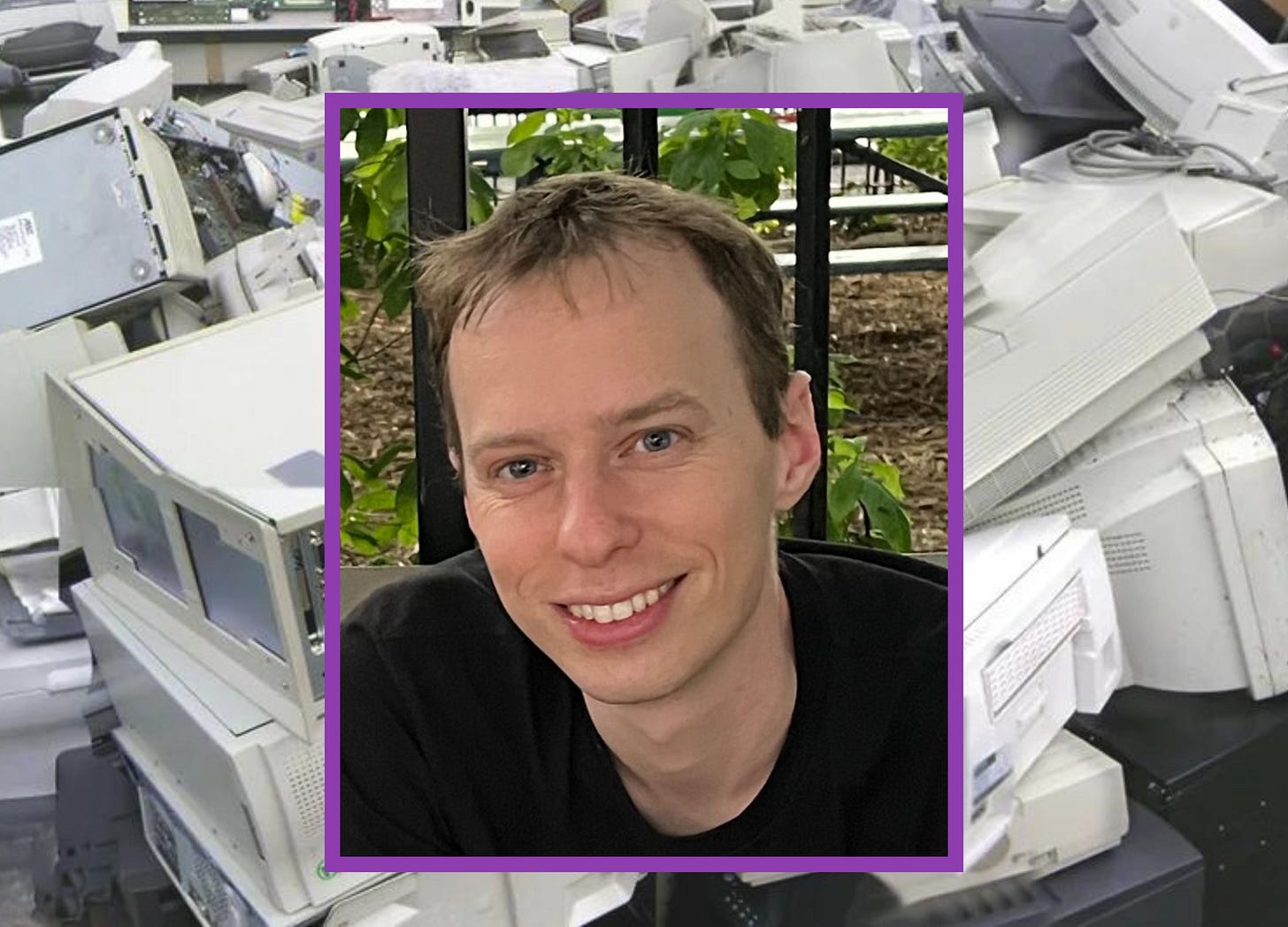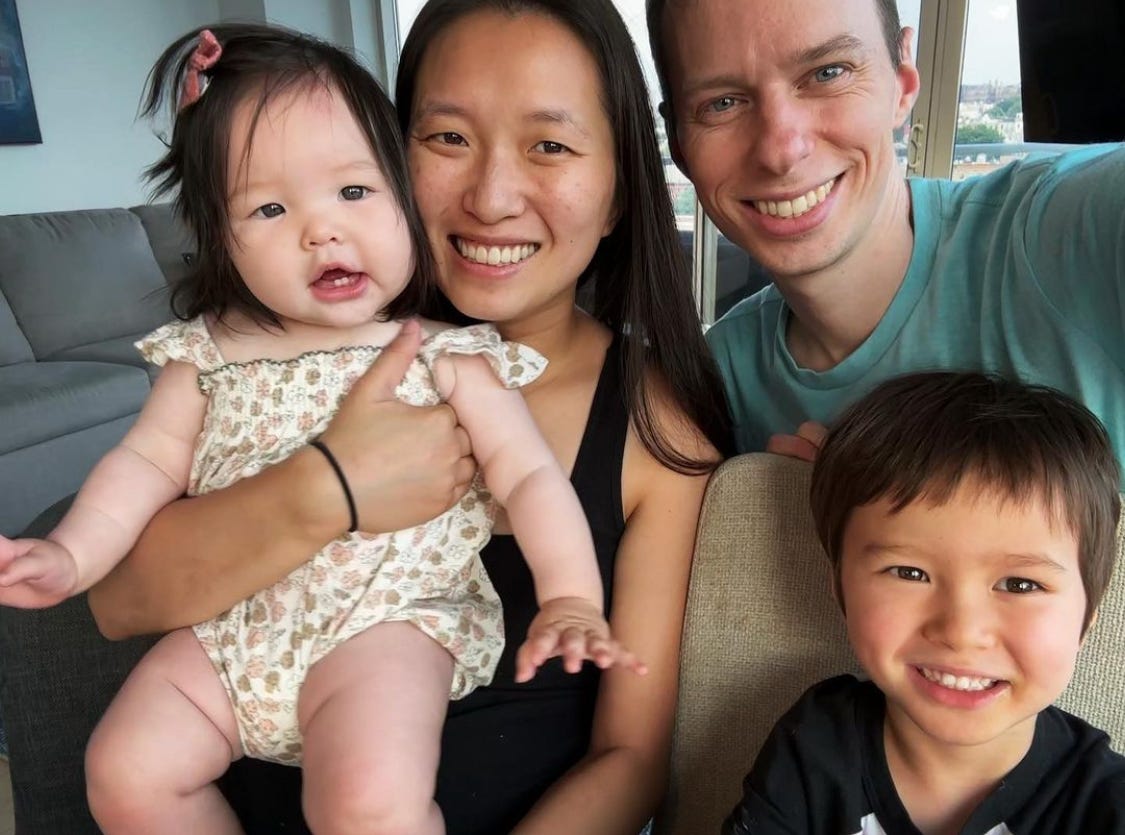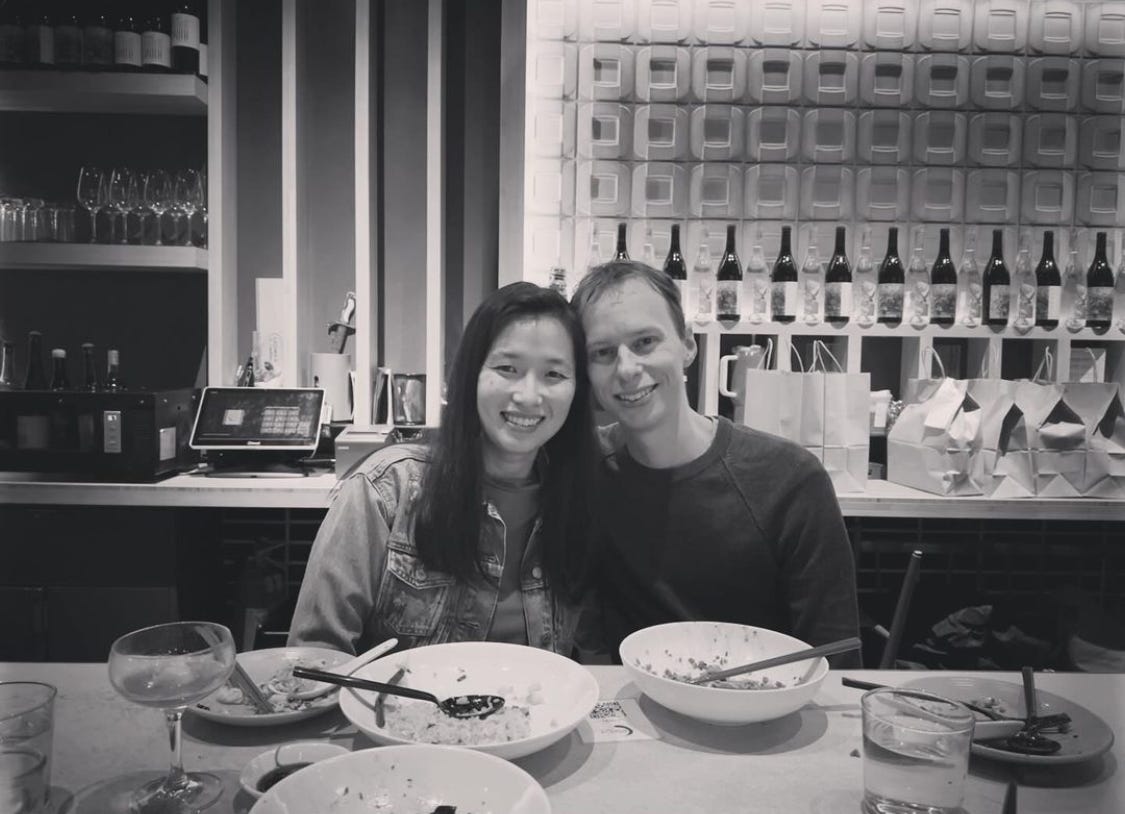Nick Bergson-Shilcock is a Life-Long Unschooler. He Explains What That Means & What It's Like Raising Two Unschoolers in Park Slope
The Recurse Center CEO & Co-founder also reveals where to find delicious seasonal salads in Park Slope and an incredibly thoughtful gift that helped him learn Mandarin.
Thanks so much for reading Park Slope Times! I’m Kelley MacDonald, and I interview neighbors about their lives and favorite things to see, eat, and do in and around Park Slope. If you'd like to read these interviews, please upgrade to paid. If you stick with a free subscription, you’ll get occasional free emails. Thank you so much for being here!
Reading via email? You may need to click “view entire message” to read the whole thing.
Hi! How’s your week going? We drove up to Vermont a few days ago, and it feels so nice to swim in the lake and walk around barefoot outside. I’ll be soaking up time with family over the next couple weeks, so I’m taking a little break from the newsletter. I have a local story to share with you early next week, and then I’ll be back on July 19th with an interview. Also, I’ll be popping up at Open Streets(!) in mid-July, which I’ll share more about soon.
As for today, I’m excited to feature Nick Bergson-Shilcock. I met Nick and his family in Prospect Park last year and learned that he’s a lifelong unschooler; prior to college, Nick never went to school. My interest immediately piqued — I had never even heard the word unschooling before meeting Nick. “From a very young age, I was given both a lot of free space and time to play — to be outside, to build forts, to explore nature. But also to realize what I gravitated towards and what I was interested in,” says Nick.
As CEO and Co-founder of The Recurse Center, a retreat for computer programmers to recharge and rediscover their joy for programming, Nick combines his deep belief in self-direction and self-discovery with his expertise in computer programming. “Our mission is to transform people's lives by helping them direct themselves…and for many people, it’s the most self-directed, free environment they’ve been in.”
In his interview, Nick shares his experiences growing up as an unschooler in the suburbs of Philadelphia, how he landed in Park Slope, and the challenges of unschooling his two young children in an urban environment. He also shares his Park Slope favorites, including a Lunar New Year celebration, kids’ play space, and specialty food market.
Kelley MacDonald: Hi Nick! Thanks so much for chatting with me today. I’m excited to dive into your experience with unschooling, but before we talk about that, when did you move to Park Slope? And what attracted you to the neighborhood?
Nick Bergson-Shilcock: I moved here begrudgingly in May of 2008 [laughs]. I had just finished my second bachelor's degree, and I wanted to be in Manhattan. But after college, I decided to live with a few really good friends, and they all wanted to move to Brooklyn. It was more important to me to be with my friends, so we ended up finding a spot on DeGraw Street. Then, I very quickly loved the neighborhood, and I’ve lived in Park Slope ever since.
What feels different about the neighborhood now compared to 2008; how has it evolved from your perspective?
I would say, fundamentally, it's the same neighborhood; the general feel is still very much the same. But when I first moved here, it was right in the wake of the great financial crisis, and the most obvious thing was a lot of the construction projects on Fourth Ave that were underway and getting started paused for the first couple of years that I lived here. It was really fascinating to see these projects right at the Park Slope-Gowanus border that were halfway under construction just stop, and then, a few years later, start, and now, they're full steam ahead again. It’s always changing in terms of the restaurants and shops, but the neighborhood character has stayed consistent over time.
Okay, let’s talk about unschooling. I’d never heard the word unschooling until I met you, and I think it’s safe to assume the majority of PST readers either have never heard about unschooling or don’t really know what it means. So, could you start by giving us a definition of unschooling?
Unschooling is a form of homeschooling. The version of it that we practice starts with a few basic philosophical beliefs. The first is a deep belief in intrinsic motivation and self-direction — how people learn and flourish; how they learn to do really hard and important things; and how they build meaning in their lives. This ultimately comes from within. This ties into our other belief, which is that young people — children — are people too, and to the greatest extent possible, we want to give them real respect and — with healthy, developmentally appropriate boundaries — freedom. So our goal with unschooling is to give our two young people great exposure to the world and to provide them with a lot of different resources and opportunities to explore, but without coercing or forcing them to do any of it. Instead, [we want to] see where their natural curiosity leads them, and then find ways to support the development of those interests throughout their whole lives. So, as they get older and older, they can be more and more in charge of directing their own time and education.
One thing that's worth mentioning that differentiates unschooling from homeschooling is that a lot of times, homeschooling is about recreating the school environment and the basic ideas and beliefs of school, but at home. Also, for some people who homeschool, their motivation for homeschooling is to expose their children to fewer things. And while that’s part of our motivation — not to expose our children to negative things, like bullying or other negative aspects of traditional schools — the primary reason we do it is actually to expose our young people to more things, to a greater diversity of people of all ages, and perspectives, and backgrounds. To be immersed in the world and to allow the world to be your classroom, rather than trying to recreate a version of school in your house. What we're doing is emphatically not school at home — it is unschooling. It is helping our young people have the opportunity to explore and be immersed in the world from the very beginning of their life.
Unschooling is a term that was defined in the 1970s, I believe, by a former school teacher, John Holt, who started exploring ideas about why schools weren't working very well, in his experience. He's the originator of the term and a lot of these ideas. He wrote a series of books, one called “How Children Fail,” which is kind of his diary and journal of observations of what wasn't working in a traditional classroom environment. [That book was] the beginning of his journey into developing the philosophy and set of ideas that led to unschooling.

What is your history with unschooling?
I grew up in the suburbs of Philadelphia, about 20-30 minutes outside of the city. I’m one of four children; I have three older sisters. All four of us, from when we were born up until we went to college, were unschooled. Our parents really did follow the general philosophy of giving us tremendous freedom and opportunities to be immersed in the world, explore things, and develop our own interests. So, from a very young age, I was given both a lot of free space and time to play — to be outside, to build forts, to explore nature. But also to realize what I gravitated towards and what I was interested in. My parents, rather than acting as teachers, were more like facilitators. They tried to understand what I was interested in, and then, look for opportunities in the community or in the world that would support my continued growth and development.
I became very interested in computers at a young age, and so [my parents] helped me get old, cheap, broken computers that I could explore and play with, and helped me find a tutor that I could work with who helped me learn some of the math and ideas that I was particularly excited about learning. As I got older, I started taking college courses early so that I could learn more about computer science and dive further into that. So they were finding ways to support what I was interested in and trying to help me connect with others and be out in the world to keep learning about the things I was excited about.
Readers might be surprised to hear that you took traditional college courses before going to college — I was! When I started researching unschooling, my initial assumption was that unschoolers do not participate in any sort of traditional school. But I’ve learned from you and my research that that isn’t true.
To me, the thing that is most important is the lack of coercion. When you participate in a traditional school system [as an unschooler], you're giving true consent — it’s the young person's choice to opt into that rather than something they're being forced to do against their will. That, to me, is key. And then, I think other things that are implicitly assumed in a lot of the traditional schools is that there's some fixed set of facts or things that people have to know by certain dates, which I emphatically reject and think is pretty silly. But it's deeply held by most of the world as a core belief, which is, in the most extreme version, things like you need to know specific facts about US history by the end of ninth grade.
I didn't choose to do this, but growing up, any of us who wanted to opt into individual classes or participate in after-school activities were open to doing that. I never chose to do that, but one of my sisters chose to play varsity soccer at the local high school. We were fortunate enough to live in a school system where the superintendent was very friendly to homeschoolers and unschoolers, and you're paying all of the taxes, so it makes total sense that they allowed this, but not all schools are like this.
In your experience, what are the most significant challenges of unschooling?
You're choosing to take a different path than most people, which manifests in a few different ways. The thing that I felt growing up is that people, especially 30 years ago, were even less likely to have ever come across unschoolers — or even, sometimes, homeschoolers — and people really question you or feel threatened because you've taken a different path or made a different set of choices. It is a challenge to feel like people are questioning you or asking you to somehow prove yourself, even as a young person to be quizzed by strangers at the supermarket as soon as they found out that I didn't go to school.
A challenge for us now as parents is that overwhelmingly everyone in our cohort and around the neighborhood is going to typical full-time school programs. Finding the community and other parents who share our values, perspectives, and goals for our young people, and finding other young people in the neighborhood who aren't in school or other full-time programming, is definitely a challenge.
Where are you and your family in terms of finding a community in and around Park Slope that aligns with your values?
I would describe it as an ongoing process. We have definitely found a community in Park Slope of really close and wonderful friends and neighbors who we enjoy spending lots of time with and whose kids our kids enjoy spending time with. It’s definitely been much harder to find the overlap between that and people choosing to take the same or a similar kind of alternative path in terms of how they're supporting their children's education. That adds yet another constraint.
So, while our children are still so young, we’re really focused on finding other families who we and our children enjoy spending time with and not being so focused on whether or not they're following the same or similar educational path as us. We've emphasized the family dynamics and parenting styles rather than whether or not they're going to school or what type of school they're going to do.
What was it like finding a childcare provider?
Keep reading with a 7-day free trial
Subscribe to Park Slope Times to keep reading this post and get 7 days of free access to the full post archives.







